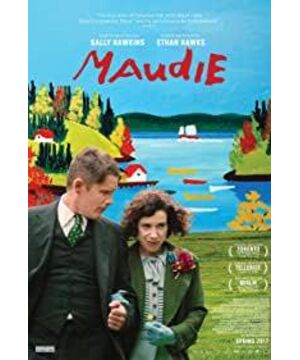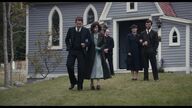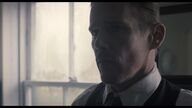My aunt's house is comfortable and she's welcome, but Mo Di shows up at the door of Everett, a poor bachelor who sells fish for a living, in response to an ad he advertises in a local store looking for a live-in nanny. They married shortly after, when Everett was 44 and Mo Di was about 36 or 37.
Their home is a tiny shed-like structure with just three windows and a loft, less than 16 square meters, so close to the road that truck drivers can roll down the windows and leave their cigarettes on their doorstep. Mo Di accompanies her husband every day to sell fish to customers and sells her Christmas cards for 25 cents. After some success, she painted on surfaces of various materials and in various parts of the home, with encouragement from her husband. Their lives have always been poor, with only oil lamps at home and a wood stove as the only source of heat for cooking and living, and most of their money comes from selling Maud's art.
Mo Di's paintings are colorful, often flowers, cows, horses, birds, deer or cats, and many of her paintings are outdoor scenes. Their house is so bright and colorful that many people stop by the road to admire the daffodils on the windows, the bluebirds on the dampers, the butterflies and swans on the inner doors. Later, numerous tourists and travelers were attracted by her hand-painted signs for sale. Mo Di had been a smoker and died of pneumonia in 1970.
The film also tells that Mo Di had a girl before. I didn't see the beginning of the film, so I don't know what the plot was. Not long after the child was born, the family thought that Mo Di was incapable of raising the child. When Maud was asleep, her brother sold the child to a family who lived well, but they lied to Mo Di that the child was born with defects and died and buried. Later, her aunt told her the truth, and her husband helped her find a family to buy the child. Mo Di was taken by her husband to secretly see her daughter, who had grown into a big girl, but she couldn't let her know.
The film ended soon after Mo Di died. In real life, Everett continued to live in his tiny house after Modi's death, with no apparent source of income, but many in the community believed he had possessions hidden at home. He died violently in 1979 while refusing to reveal the location of the money to a robber. In 1984, the province of Nova Scotia purchased the Maud and Everett homes, ownership transferred to the Nova Scotia Art Gallery, and the house was eventually transferred to the Scotiabank Maud Lewis Gallery.
The film left a deep impression on me not only by Mo Di's talent and the moving music of the film, but it also made me deeply realize that looking at people must break through the barriers of appearance, and it must be understood through a person's words, deeds and works. A real personal world. Mo Di is not good-looking and has disabilities, but her world is so beautiful. Mo Di's sensitivity to art and artistic style are also reflected in her gentle dialogue with animals, gentle support and compliance with her husband's authority, and her words, deeds and talents gradually make her macho husband gradually develop love and affection for her. rely.
A film, an extraordinary perceptive artistic life. Life is like this, although not rich, but very rich and happy, valuable and worthwhile.
View more about Maudie reviews











